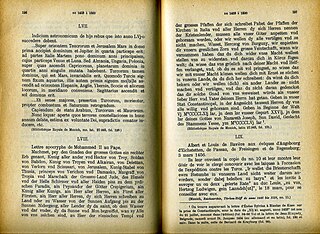
Apocrypha are biblical or related writings not forming part of the accepted canon of Scripture. While some might be of doubtful authorship or authenticity, in Christianity, the word apocryphal (ἀπόκρυφος) was first applied to writings which were to be read privately rather than in the public context of church services. Apocrypha were edifying Christian works that were not considered canonical scripture. It was not until well after the Protestant Reformation that the word apocrypha was used by some ecclesiastics to mean "false," "spurious," "bad," or "heretical."
The deuterocanonical books are books and passages considered by the Catholic Church, the Eastern Orthodox Church, the Oriental Orthodox Churches or the Assyrian Church of the East to be canonical books of the Old Testament, but which Jews and Protestants regard as apocrypha. They date from 300 BC to 100 AD, before the separation of the Christian church from Judaism. While the New Testament never directly quotes from or names these books, the apostles quoted the Septuagint, which includes them. Some say there is a correspondence of thought, and others see texts from these books being paraphrased, referred, or alluded to many times in the New Testament, depending in large measure on what is counted as a reference.
The Old Testament (OT) is the first division of the Christian biblical canon, which is based primarily upon the 24 books of the Hebrew Bible, or Tanakh, a collection of ancient religious Hebrew and occasionally Aramaic writings by the Israelites. The second division of Christian Bibles is the New Testament, written in Koine Greek.
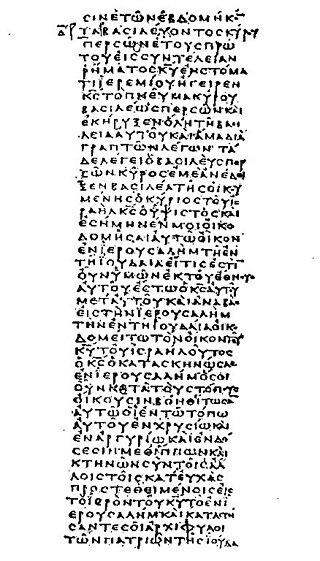
The Septuagint, sometimes referred to as the Greek Old Testament or The Translation of the Seventy, and often abbreviated as LXX, is the earliest extant Greek translation of the Hebrew Bible from the original Hebrew. The full Greek title derives from the story recorded in the Letter of Aristeas to Philocrates that "the laws of the Jews" were translated into the Greek language at the request of Ptolemy II Philadelphus by seventy-two Hebrew translators—six from each of the Twelve Tribes of Israel.

The Revised Standard Version (RSV) is an English translation of the Bible published in 1952 by the Division of Christian Education of the National Council of the Churches of Christ in the USA. This translation itself is a revision of the American Standard Version (ASV) of 1901, and was intended to be a readable and literally accurate modern English translation which aimed to "preserve all that is best in the English Bible as it has been known and used through the centuries" and "to put the message of the Bible in simple, enduring words that are worthy to stand in the great Tyndale-King James tradition."

The English Standard Version (ESV) is a translation of the Bible in contemporary English. Published in 2001 by Crossway, the ESV was "created by a team of more than 100 leading evangelical scholars and pastors." The ESV relies on recently published critical editions of the original Hebrew, Aramaic, and Greek texts.
The Prayer of Manasseh is a short, penitential prayer attributed to king Manasseh of Judah.

The Prayer of Azariah and Song of the Three Holy Children, abbreviated Pr Azar, is a passage which appears after Daniel 3:23 in some translations of the Bible, including the ancient Greek Septuagint translation.

The New Testament apocrypha are a number of writings by early Christians that give accounts of Jesus and his teachings, the nature of God, or the teachings of his apostles and of their lives. Some of these writings were cited as scripture by early Christians, but since the fifth century a widespread consensus has emerged limiting the New Testament to the 27 books of the modern canon. Roman Catholic, Eastern Orthodox, and Protestant churches generally do not view the New Testament apocrypha as part of the Bible.
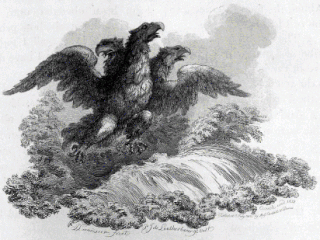
2 Esdras is an apocalyptic book in some English versions of the Bible. Tradition ascribes it to Ezra, a scribe and priest of the fifth century BC, whom the book identifies with the sixth-century figure Shealtiel.
Psalm 151 is a short psalm found in most copies of the Septuagint (LXX), but not in the Masoretic Text of the Hebrew Bible. The title given to this psalm in the Septuagint indicates that it is supernumerary, as no number is affixed to it. The psalm is ascribed to David. It is also included in some manuscripts of the Peshitta. The psalm concerns the story of David and Goliath.

The Oxford Annotated Bible (OAB), published also as the New Oxford Annotated Bible (NOAB), is a study Bible published by the Oxford University Press. The notes and the study material feature in-depth academic research from nondenominational perspectives, specifically secular perspectives for "Bible-as-literature" with a focus on the most recent advances in historical criticism and related disciplines, with contributors from mainline Protestant, Roman Catholic, Jewish, and nonreligious interpretative traditions.
The Life with God Bible is a study Bible published by Harper in 2005, and utilizes the New Revised Standard Version (NRSV). It was formerly published under the name Renovaré Spiritual Formation Bible, but has been republished under the Life with God title.

Bruce Manning Metzger was an American biblical scholar, Bible translator and textual critic who was a longtime professor at Princeton Theological Seminary and Bible editor who served on the board of the American Bible Society and United Bible Societies. He was a scholar of Greek, New Testament, and New Testament textual criticism, and wrote prolifically on these subjects. Metzger was an influential New Testament scholar of the 20th century. He was elected to the American Philosophical Society in 1986.
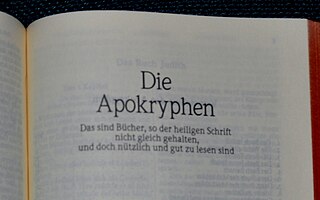
The biblical apocrypha denotes the collection of apocryphal ancient books thought to have been written some time between 200 BC and AD 100. The Catholic, Eastern Orthodox and Oriental Orthodox churches include some or all of the same texts within the body of their version of the Old Testament, with Catholics terming them deuterocanonical books. Traditional 80-book Protestant Bibles include fourteen books in an intertestamental section between the Old Testament and New Testament called the Apocrypha, deeming these useful for instruction, but non-canonical. To this date, the Apocrypha are "included in the lectionaries of Anglican and Lutheran Churches". Anabaptists use the Luther Bible, which contains the Apocrypha as intertestamental books; Amish wedding ceremonies include "the retelling of the marriage of Tobias and Sarah in the Apocrypha". Moreover, the Revised Common Lectionary, in use by most mainline Protestants including Methodists and Moravians, lists readings from the Apocrypha in the liturgical calendar, although alternate Old Testament scripture lessons are provided.
The Old Testament is the first section of the two-part Christian biblical canon; the second section is the New Testament. The Old Testament includes the books of the Hebrew Bible (Tanakh) or protocanon, and in various Christian denominations also includes deuterocanonical books. Orthodox Christians, Catholics and Protestants use different canons, which differ with respect to the texts that are included in the Old Testament.

The term Catholic Bible can be understood in two ways. More generally, it can refer to a Christian Bible that includes the whole 73-book canon recognized by the Catholic Church, including some of the deuterocanonical books of the Old Testament which are in the Greek Septuagint collection, but which are not present in the Hebrew Masoretic Text collection. More specifically, the term can refer to a version or translation of the Bible which is published with the Catholic Church's approval, in accordance with Catholic canon law.
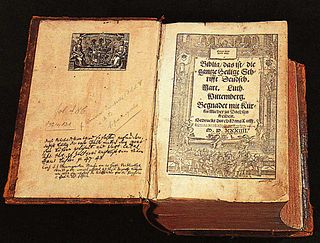
Luther's canon is the biblical canon attributed to Martin Luther, which has influenced Protestants since the 16th-century Protestant Reformation. While the Lutheran Confessions specifically did not define a biblical canon, it is widely regarded as the canon of the Lutheran Church. It differs from the 1546 Roman Catholic canon of the Council of Trent in that it rejects the deuterocanonical books and questions the seven New Testament books, called "Luther's Antilegomena", four of which are still ordered last in German-language Luther Bibles to this day.
A biblical canon is a set of texts which a particular Jewish or Christian religious community regards as part of the Bible.

A Protestant Bible is a Christian Bible whose translation or revision was produced by Protestant Christians. Typically translated into a vernacular language, such Bibles comprise 39 books of the Old Testament and 27 books of the New Testament, for a total of 66 books. Some Protestants use Bibles which also include 14 additional books in a section known as the Apocrypha bringing the total to 80 books. This is in contrast with the 73 books of the Catholic Bible, which includes seven deuterocanonical books as a part of the Old Testament. The division between protocanonical and deuterocanonical books is not accepted by all Protestants who simply view books as being canonical or not and therefore classify books found in the Deuterocanon, along with other books, as part of the Apocrypha. Sometimes the term "Protestant Bible" is simply used as a shorthand for a bible which contains only the 66 books of the Old and New Testaments.











